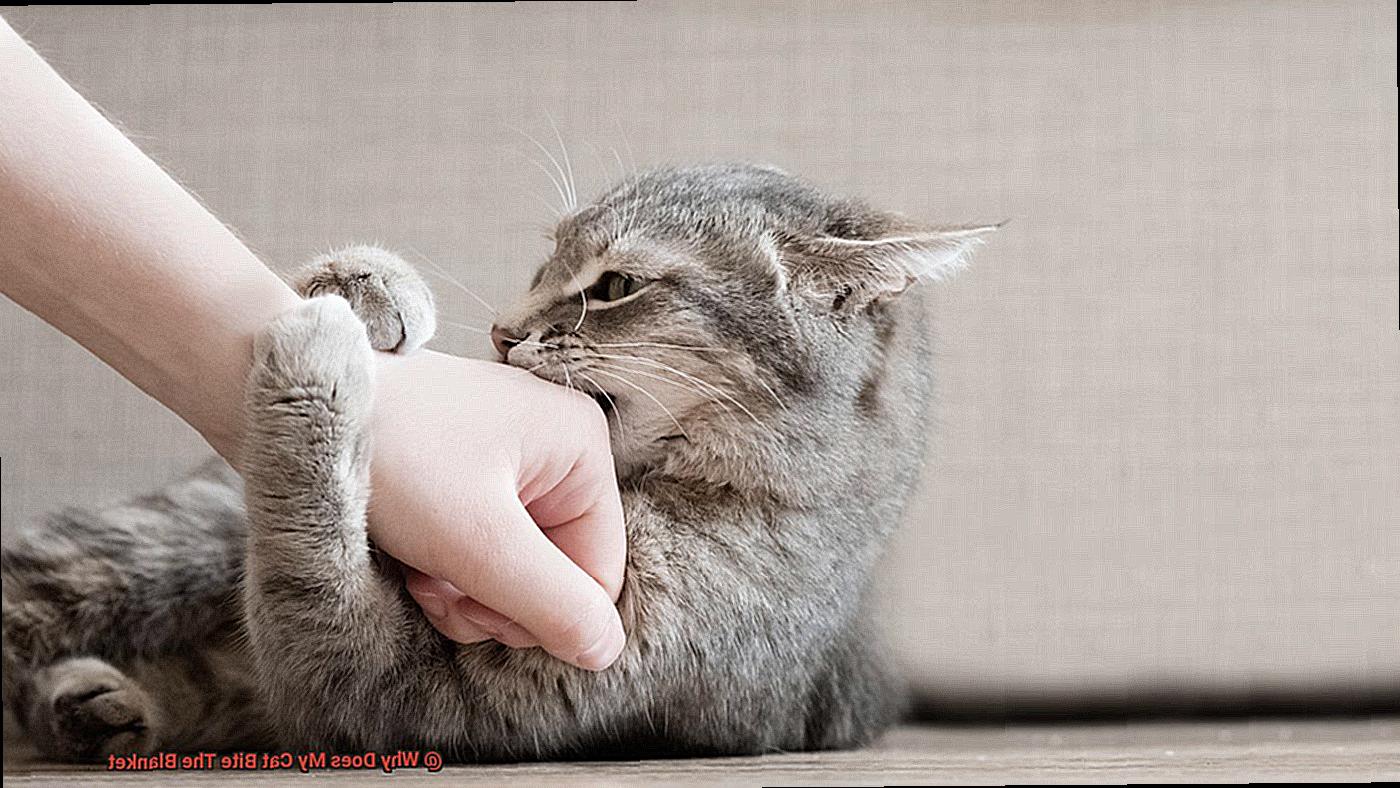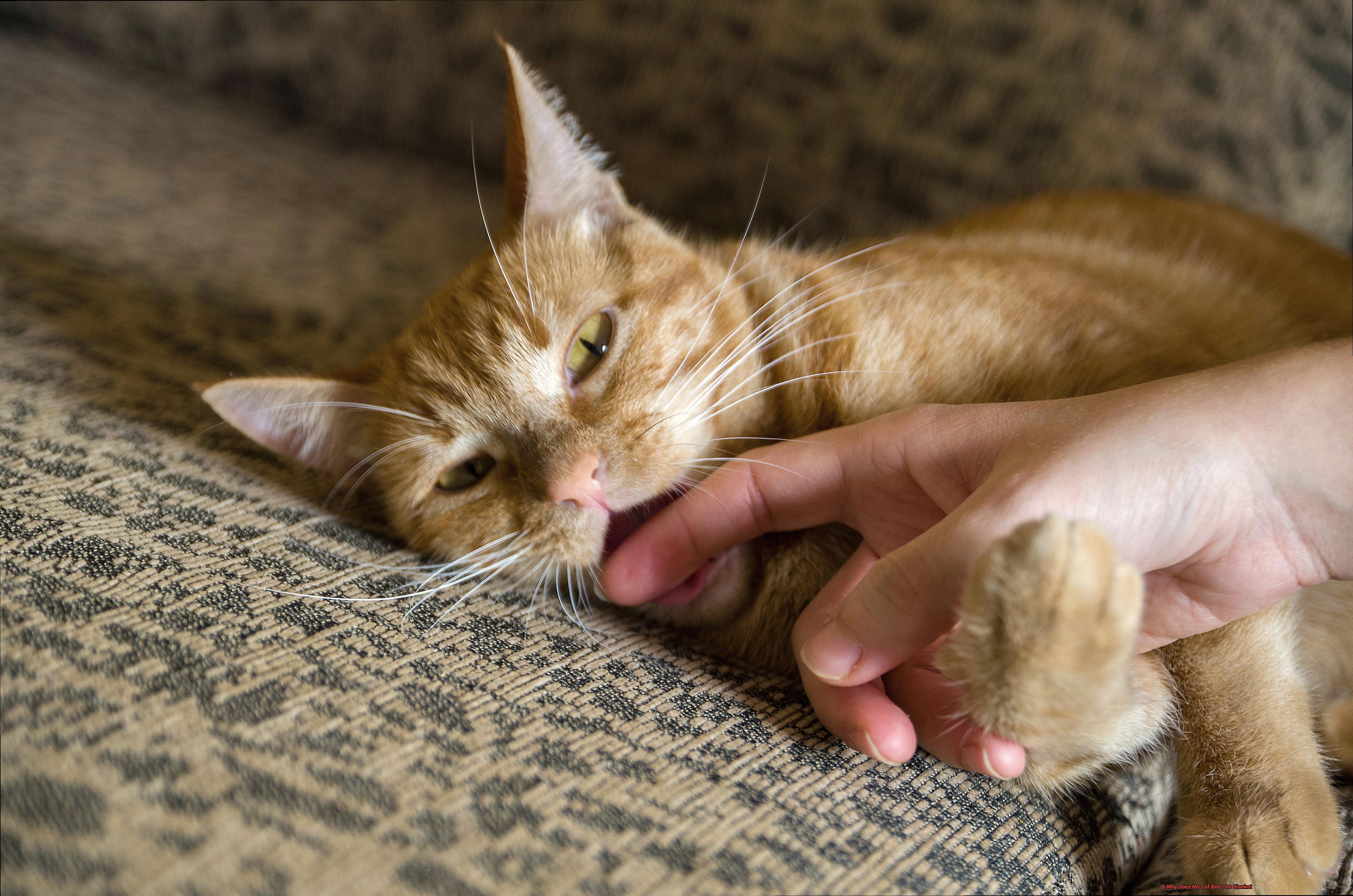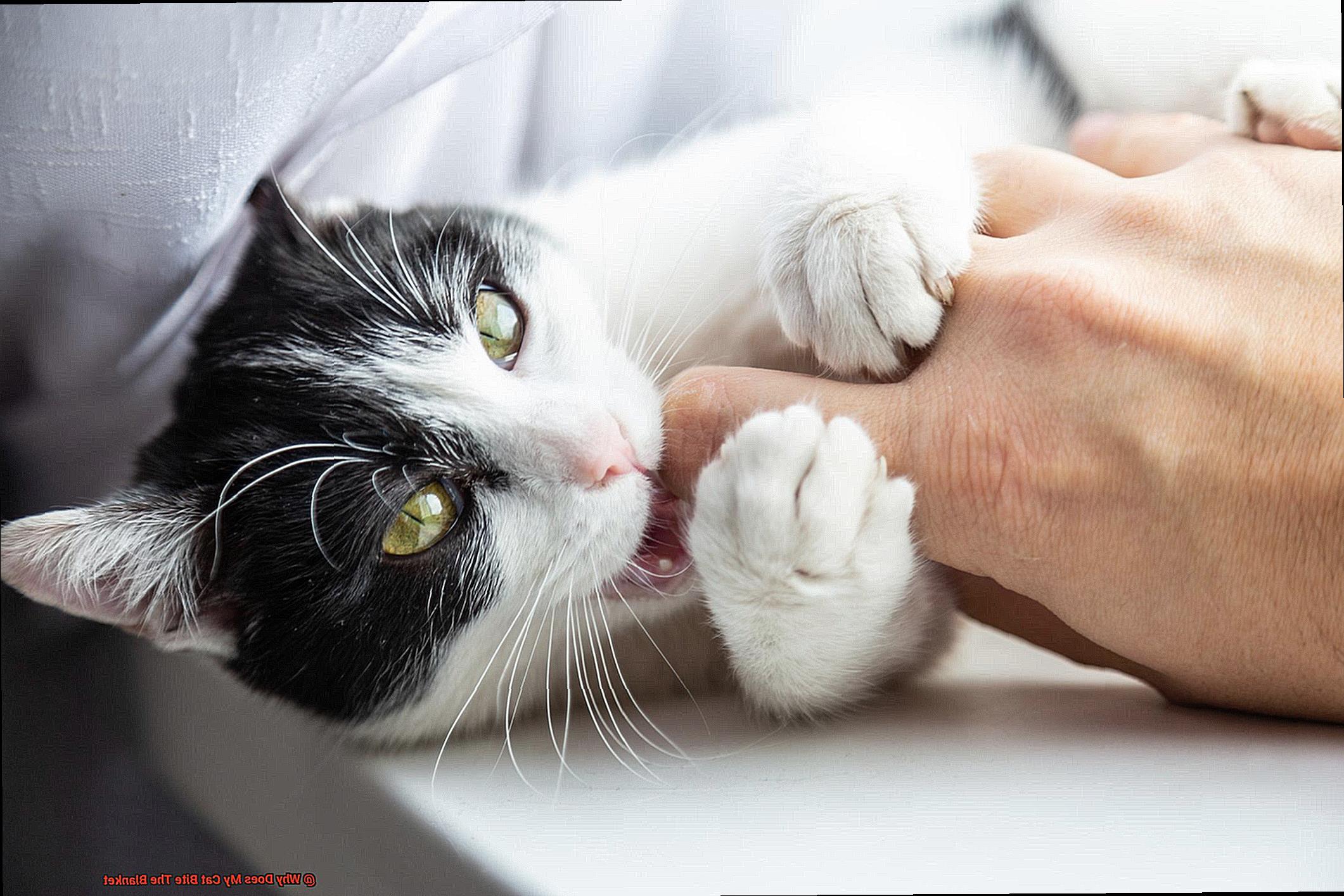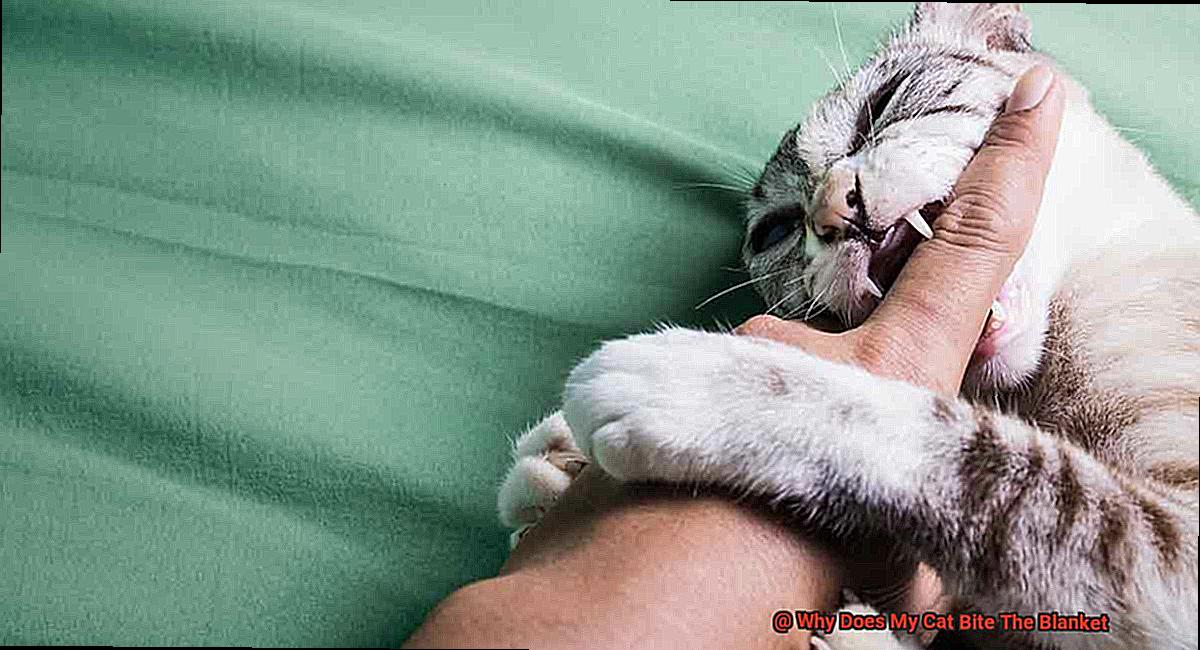Have you ever caught your cat biting the blanket while they knead and purr away in bliss?
It’s a peculiar behavior that may leave you scratching your head. But fear not, as an expert in feline behavior, I can shed some light on why your furry friend is engaging in this strange habit.

Firstly, it could be a sign of affection. Cats are known to knead when they feel comfortable and content.
Blankets provide a cozy environment that helps cats relax and feel at ease. Biting the blanket during kneading could be their way of showing affection towards their favorite snuggle buddy.

On the other hand, biting the blanket could also be an instinctual behavior for cats. As natural predators, they practice their hunting skills by biting and clawing.
So, when they’re kneading on the blanket, it’s possible that they’re honing those instincts. But let’s not forget about playtime.

Cats love to play and interact with their surroundings. Blankets offer an excellent opportunity for cats to indulge in mentally stimulating play by interacting with the fabric and engaging in playful bites.
In conclusion, while it may seem odd at first glance, biting blankets is just another charming aspect of your cat’s personality. Understanding the reasons behind this behavior only adds to our appreciation of these fascinating creatures.
What is Cat Biting?
While this may seem like a strange and confusing behavior, there are several reasons why cats may do this.
Firstly, biting and attacking objects such as blankets or toys is a way for cats to fulfill their natural instinctive behavior of hunting and playing. As predators by nature, cats have a strong desire to engage in activities that simulate hunting, and biting blankets can help them achieve this.
However, excessive blanket biting can be a sign of anxiety or stress in your cat. Recent changes in the household or routine can cause your cat to turn to chewing or biting as a way to cope with their emotions.
If you notice your cat is biting blankets excessively, it’s essential to intervene and redirect their behavior towards more appropriate toys or objects. Moreover, some cats may bite blankets as a form of self-soothing behavior.
Just like humans use comfort items like blankets or stuffed animals, some cats may find comfort in biting and kneading blankets. This behavior can help them feel more relaxed and secure.
It’s important to monitor your cat’s behavior and redirect them if they start ingesting the fabric. Ingesting fabric can lead to digestive issues or even blockages, which can be potentially life-threatening for your cat.
Lastly, certain medical issues can also cause cats to engage in blanket biting. Dental problems or gastrointestinal issues can cause cats to chew on non-food items, including blankets.
If you notice that your cat is biting blankets excessively, take them to the veterinarian for a check-up. In conclusion, understanding why your cat engages in blanket biting can help you provide appropriate solutions to keep them happy and healthy.
By providing mental and physical stimulation through playtime and environmental enrichment, monitoring their behavior, and seeking medical attention if necessary, you can ensure your cat’s safety and happiness.
Why Do Cats Bite Blankets?
Cats are curious creatures, and their playful nature often leads them to nibble on various objects, including blankets.
While it may seem like a peculiar behavior, blanket biting is entirely natural for our feline friends. One of the primary reasons why cats bite blankets is that it provides them with a sense of comfort.

The soft texture of the fabric can mimic the sensation of being groomed by their mother or other cats, which makes them feel secure and relaxed. It’s no wonder that many cats choose to snuggle up with their favorite blanket when they’re feeling anxious or stressed.
Apart from comfort, cats may also bite on blankets to mark their territory. Their mouths have scent glands, which they use to leave behind their scent as a way to claim ownership over the object.
This behavior is especially common in multi-cat households where cats may compete for resources and try to assert dominance over each other. Sometimes, blanket biting can also be a sign of boredom or a plea for attention.
Cats are intelligent animals that require mental and physical stimulation to stay happy and healthy. If they’re feeling neglected or understimulated, they may resort to destructive behaviors like biting on objects to get their owner’s attention.
As a responsible cat owner, it’s essential to provide your furry friend with plenty of toys and playtime to prevent destructive behaviors. Interactive toys like feather wands or puzzle feeders can provide mental stimulation and satisfy your cat’s natural hunting instincts.
Incorporating vertical spaces like cat trees or window perches can also provide environmental enrichment and encourage exercise. However, while blanket biting may be a natural behavior for cats, excessive biting can indicate anxiety or stress.
As a pet owner, it’s important to redirect your cat’s behavior towards appropriate toys and objects to prevent ingestion of fabric that can lead to blockages. Understanding why your cat engages in blanket biting can help you keep them happy and healthy by providing mental and physical stimulation through playtime and environmental enrichment.
In conclusion, blanket biting is just another quirk of our feline friends. By providing our cats with ample stimulation, we can keep them happy and healthy while preventing destructive behaviors.
Remember to redirect your cat’s behavior towards appropriate toys and objects, and watch out for any signs of excessive biting that could indicate anxiety or stress.
Hunting and Playing Instincts
While this behavior may seem unusual or even alarming, it’s merely a part of your cat’s natural instincts.
Cats are natural hunters and have an innate desire to stalk, pounce, and play. Even domesticated cats still retain these hunting instincts, which is why they often engage in playful behavior like attacking toys and chasing shadows.

So when your cat bites on a blanket, it’s not uncommon as they might see it as prey. The soft texture and movement of blankets can resemble small animals like mice or birds, triggering their hunting instinct and causing them to attack the blanket as if it were prey.
Apart from its hunting instincts, cats also bite blankets as a form of play. Biting and chewing on objects can be entertaining and stimulating for cats, especially when they’re bored or looking for something to do.
Hence, if your cat is feeling playful or restless, they may resort to biting blankets as a way to keep themselves occupied. However, excessive or repetitive blanket biting can be a sign of underlying issues like anxiety or stress.
Marking Territory
Before you get too upset, it’s important to understand that cats have a natural instinct to mark their territory.
They achieve this by using scent glands located on various parts of their bodies, including their paws, face, and tail. Biting or chewing on blankets is one way that cats can leave their scent behind and claim their spot.
Don’t be surprised if you catch your cat gnawing on your favorite blanket during playtime. Cats love to play and explore their surroundings, and biting on objects like blankets can be an entertaining way for them to do so.
However, excessive or repetitive biting or chewing can be a red flag for deeper issues like anxiety or stress. If your cat is exhibiting this behavior frequently, it’s crucial to provide them with plenty of toys and mental stimulation to keep them happy and healthy.
Consulting with a veterinarian or animal behaviorist is also vital if your cat’s biting or chewing behavior is excessive or causing damage to your belongings. They can help address any underlying anxiety issues and provide guidance on how to redirect your cat’s behavior.
As responsible pet owners, we must observe our cats’ behavior and provide them with the necessary tools to keep them entertained and healthy.
Self-Soothing Behavior
While this behavior is relatively common, excessive biting could be a sign of anxiety or stress.
So, why do cats bite blankets, and what are the potential consequences? One possible reason behind this behavior is self-soothing.
Cats are natural hunters and have an instinct to bite and scratch objects as part of their normal behavior. However, sometimes they do it to calm themselves down when they are feeling anxious or stressed.
Biting on blankets can provide them with sensory input that helps them feel more relaxed and at ease. Another reason why cats may bite blankets is to mark their territory or show affection.
When a cat bites a blanket, it could be leaving its scent on the object as a way to claim it as its own. Additionally, cats may bite blankets as a form of play or as a way to show affection towards their owners.
While the occasional biting on blankets is nothing to worry about, excessive biting can potentially turn into compulsive behavior in cats. If you notice that your cat is biting blankets excessively or obsessively, it could be indicative of an underlying medical issue or psychological condition.
In such cases, it is best to consult with a veterinarian or animal behaviorist for proper diagnosis and treatment. In conclusion, self-soothing behavior is one of the many reasons why cats may bite blankets.
Don’t forget to provide plenty of toys and mental stimulation for your furry friend while keeping an eye on their behavior and seeking professional help when necessary.
YlPHfMlUhLg” >
Potential Risks of Ingesting Fabric
While this behavior is normal to some degree, excessive biting can lead to potential risks, especially if your cat ingests the fabric.
Ingesting fabric can cause intestinal blockages, which can prevent food and water from passing through the digestive system. This can lead to dehydration and malnutrition, which can be life-threatening in severe cases.
Additionally, your furry friend may experience vomiting, diarrhea, and abdominal pain due to irritation in the digestive tract caused by foreign objects such as blanket fibers. If you notice any of these symptoms in your cat, it is crucial to seek prompt veterinary care.
Your veterinarian may recommend diagnostic imaging or surgery to remove the fabric blockage. To prevent your cat from ingesting fabric, it is essential to provide them with safe and appropriate toys and chew treats.
You can also redirect their attention away from blankets by offering interactive playtime or providing them with a designated scratching post or bed. Regular grooming can also help reduce the amount of loose fur and debris that your cat may ingest while grooming themselves.
By keeping an eye on their behavior and providing appropriate toys, you can help protect your furry friend from potential complications associated with ingesting fabric.
Also Read: Why Does My Cat Burrow Into Me?
Conclusion
In summary, cats biting blankets is a common behavior rooted in their natural instincts as predators.
However, it’s important to keep an eye on excessive or repetitive biting as it could be a sign of underlying issues like anxiety or stress. To keep your feline friend happy and healthy, providing them with mental and physical stimulation through playtime and environmental enrichment is crucial.
It’s also important to monitor their behavior closely and seek medical attention if necessary. While blanket biting may seem harmless, it can pose potential risks if the fabric is ingested.
Therefore, redirecting their attention towards safe toys and chew treats is key. As responsible pet owners, we must prioritize our cats’ well-being by observing their behavior and providing them with appropriate tools for entertainment.
By doing so, we can ensure that they lead fulfilling lives while avoiding destructive behaviors.







